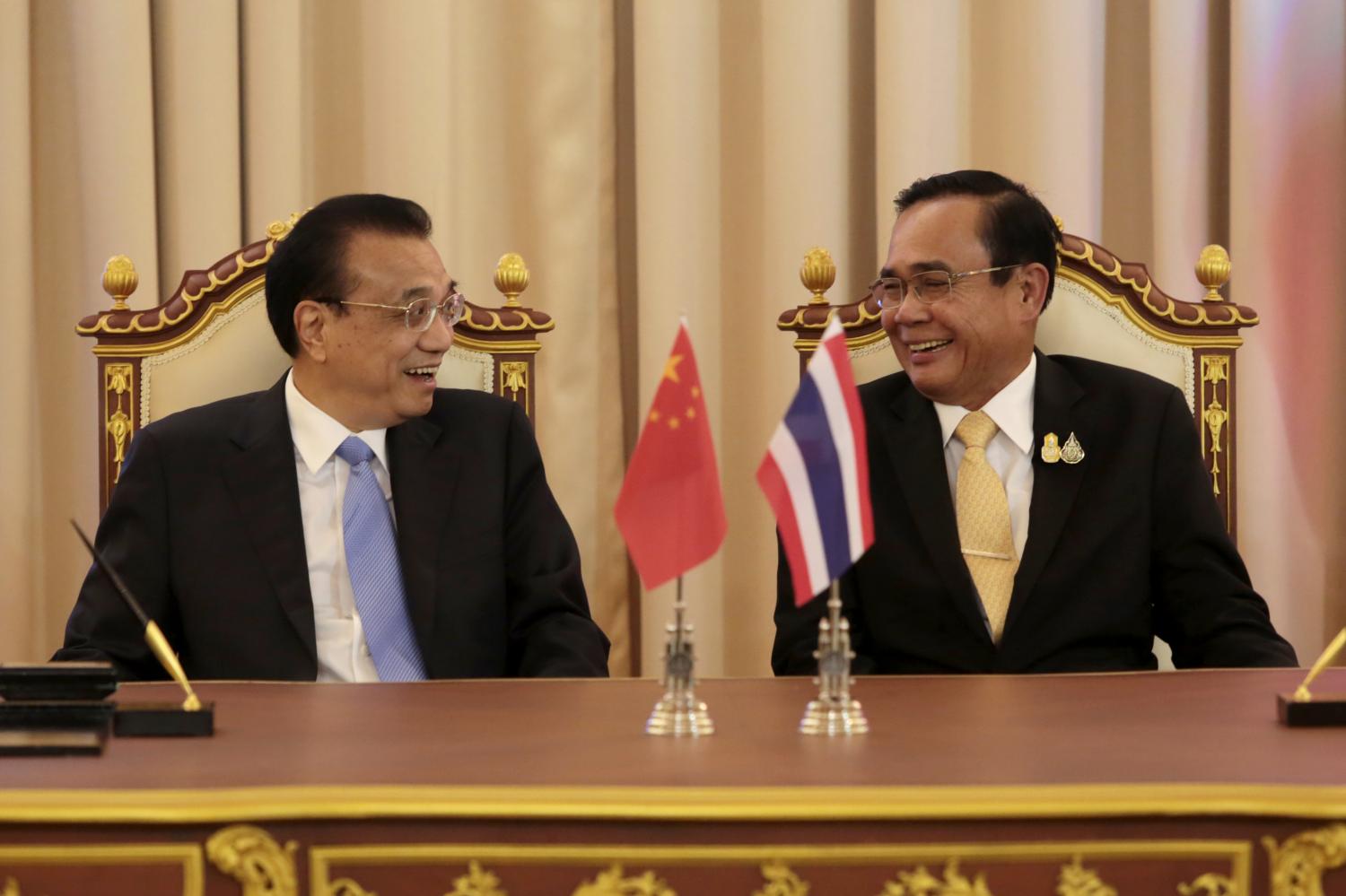
Thailand and China have agreed to boost trade and investment ties in three flagship projects: Thailand's Eastern Economic Corridor (EEC) investment scheme, the Sino-Thai high-speed railway project, and China's Belt and Road Initiative.
Prime Minister Prayut Chan-o-cha, speaking after meeting Chinese Premier Li Keqiang at Government House on Tuesday, said they had discussed a wide range of topics covering the economy, politics, security, science and technology, innovation, social and cultural issues, as well as regional and global situations.
The two sides agreed that the Chinese premier's official visit was another important milestone which has cemented the strategic partnership and cooperation between Thailand and China, and has also set the direction for future ties.
The visit came as Thailand serves as the Asean chair and China marks the 70th anniversary of the People's Republic.
Both leaders underlined that it was essential to build greater connectivity between the two countries under strategies and cooperation frameworks such as the Master Plan for Asean Connectivity (MPAC) 2025, and the Ayeyawady-Chao Phraya-Mekong Economic Cooperation Strategy (ACMECS).
Gen Prayut also remarked that China's Belt and Road Initiative complemented Thailand's "Connecting the Connectivities" proposal.
He added that Thailand and China have also agreed to forge a link between the Eastern Economic Corridor through Chon Buri, Rayong and Chachoengsao, and China's Greater Bay Area (GBA), via concrete cooperation projects.
The GBA aims to link up nine cities in Guangdong -- Guangzhou, Shenzhen, Zhuhai, Foshan, Zhongshan, Dongguan, Huizhou, Jiangmen and Zhaoqing -- and the special administrative regions of Hong Kong and Macau, with the aim of developing a world-class city cluster via reforms, innovation and liberalisation.
Gen Prayut said the two sides will set up mechanisms for high-level talks to push through the cooperation projects, adding that he has invited China to expand its investment in Thailand, and to buy more Thai rice and rubber.
Thailand and China have also agreed to boost the growth of the digital economy and smart cities under Thailand's 4.0 policy to bolster the economy through innovation and technology, Gen Prayut said.
Mr Li said that Thailand and China have achieved mutual cooperation and political trust, adding that Beijing is ready to support projects such as the EEC, as well as promote cooperation on rice trade, e-commerce and the Thai-Chinese high-speed railway project.
The project is divided into two phases. The first covers a 125-billion-baht section spanning 252.5km from Bangkok to Nakhon Ratchasima. The second, which will cost 200 billion baht to build, will run 355km from Nakhon Ratchasima to Nong Khai and the Lao border, forming part of China's Belt and Road Initiative.
Mr Li said that China will continue to seek cooperation from Thailand and strengthen bilateral ties.
"We respect Thailand's role as the centre of Asean. ... China and Thailand are rowing in the same boat. We are like close brothers. We will move forward together with a bright future waiting ahead, based on the principles of equality and a good partnership," Mr Li said.
Responding, Gen Prayut said: "We are a large vessel that will speed along like a long-tailed boat."
Gen Prayut added that: "A tiny ant can sometimes help a big lion or elephant."
Mr Li also praised Thailand for its success in hosting the 35th Asean-related summits in Bangkok, which ended on Monday.
He mentioned the conclusion of negotiations on the Regional Comprehensive Economic Partnership (RCEP), saying he was confident all 16 member states will clinch the deal next year.
Asian leaders plan to sign the world's largest regional trade deal in 2020 after India said it was not ready to join. Vietnam will take the Asean chairmanship next year.
Indian Prime Minister Narendra Modi backed out of the RCEP in order to protect service workers and farmers, an official told reporters in New Delhi on Monday.
India had pushed the other 15 nations to address its concerns over deficits and open their markets to Indian services and investments, the official said.
"India has significant outstanding issues, which remain unresolved," RCEP countries said in a joint statement on Monday.
